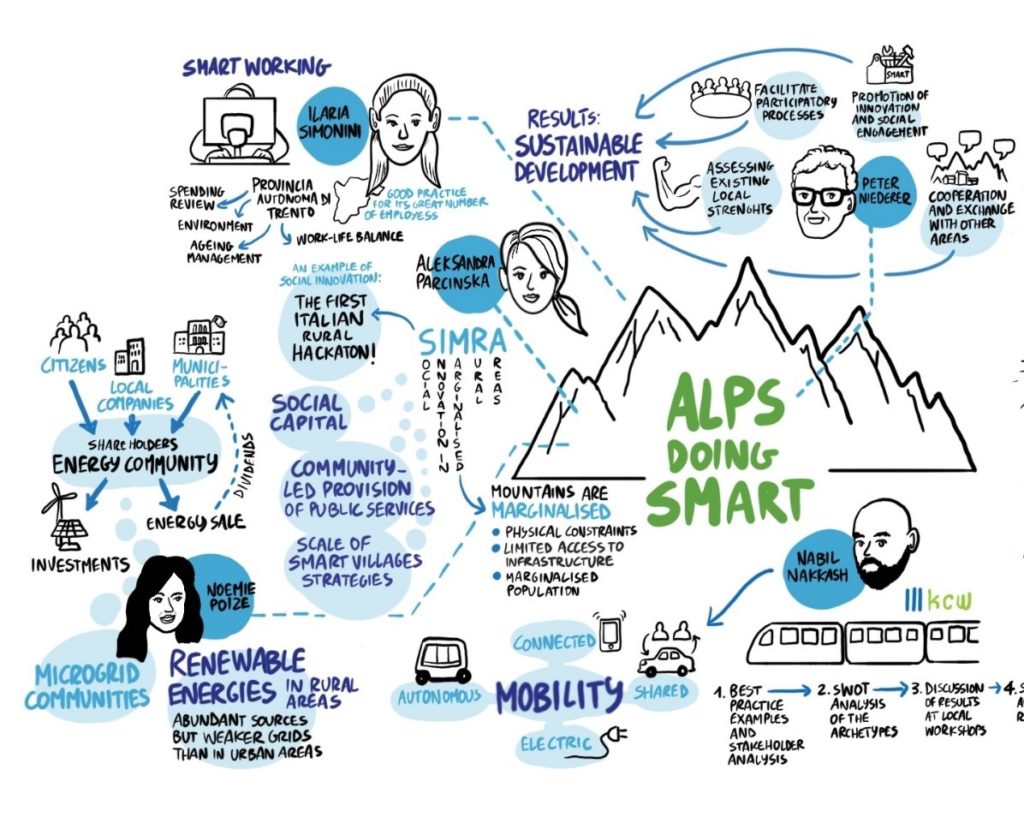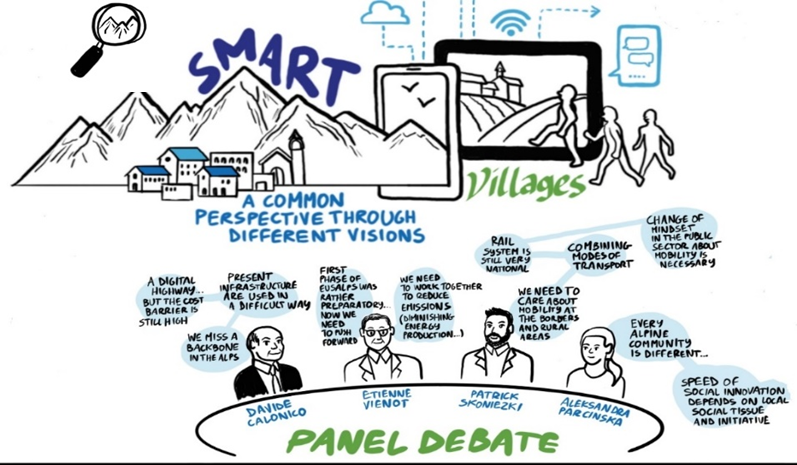On May 23rd and 24th, 2019, the Italian region of Valle d’Aosta hosted a conference on “Smart Villages – a common perspective through different visions” in the Alps.
As one of the events organised during the year of Italian Presidency of the EU Strategy for the Alpine Region (EUSALP), the conference brought together a variety of stakeholders including politicians, researchers, project managers and associations. In addition to sharing knowledge and experience, they also exchanged ideas on potential solutions. The scene was set with the ESPON study on Alps 2050, followed by the presentation of European Network for Rural Development on Smart Villages and revitalisation of rural areas through social and digital innovations. With mountains representing about 25% of the study area, SIMRA was not only presented at the event but also welcomed with a positive feedback on the project. Social innovation initiatives from Alpine communities, both identified in the SIMRA project and beyond, raised a lot of interest in the audience of otherwise technology-oriented innovation examples.
Aleksandra Parcinska (Euromontana) introduced the SIMRA project – a Horizon 2020 applied-research project focused on social innovation. With the objective of encouraging the “smartness” of marginalised rural territories, SIMRA brought interesting inputs to the Smart Villages concept in the Alpine area. As a reminder, SIMRA classified mountain areas as “marginalised” due to the physical constraints they impose, limited access to infrastructure and marginalised populations. In the presentation, the initial attention went to the definition and main aspects of social innovation researched throughout the project with attention given to the Alpine region.
Presented social innovation examples in the Alps included:
- SIMRA Innovation Action – Supporting the socio-entrepreneurial potential of local young people and the first rural hackathon in Valle Belluno, Italy; team of ETIFOR
- SIMRA Case Study – Learning-Growing-Living with women farmers in Trentino-Alto Adige, Italy; team of EURAC Research
- An example on sustainable mobility schemes – Akt!vno v šolo, Slovenia;
- An example on social services / time bank – ZEITBANK 55+, Austria;
- SIMRA Case Study – “Réseau des Fleurons”, a watchmakers’ network to support local development, Switzerland; team of University of Bern and SAB
While social innovation and Smart Villages concepts are not synonyms, they strongly relate, particularly when social innovation initiatives include the use of innovative and digital technologies. The connection comes from the reliance on the same core elements although in a varying degree:
- The importance of people and of social capital in reconfiguring social practices
- The empowerment of local communities and the engagement of civil society to take the leadership or actively participate in the provision of services of general interest
- The focus of strategies: local initiatives, responding to specific identified needs, and preferably included in larger networks
Innovation, including social innovation, is an enabler of the development of Smart Villages, bringing communities together to solve local problems, for example poor quality public services. A lesson to keep in mind when implementing the Smart Villages concept is the integrated approach when tackling local challenges in contrast to solving purely sectoral, environmental or social issues, with the overall aim of the collective well-being.

Due to the variety of stakeholders at the event, the presentation ended with key messages oriented towards local authorities and policy makers, including barriers assessment and examples of policy recommendations for social innovation. The impact of social innovation on the Smart Villages concept implementation in the Alps was further analysed.
Structural issues identified during the SIMRA project in the mountain area of the Alps were in line with the main points mentioned throughout the conference, such as a lack of soft mobility options and a disinvestment of public social services in rural areas. During the event, EUSALP Action Groups had the opportunity to share Smart Villages examples on topics of services of general interest and smart digital transformation of Alpine villages (AG5), cross-border mobility in the Alpine region (AG4), dual education and smart work in mountainous areas (AG3) or energy efficiency and microgrids (AG9), all of them in the context of Smart Villages concept development.
Towards the end of the event, Aleksandra Parcinska took part in a panel debate with other participants. Having acknowledged the diversity of Alpine communities, she stressed the importance of allowing enough time to develop and/or strengthen social capital. It is indispensable both for social innovation and Smart Villages concept’s development. For this reason, but not only, it is of importance to ensure that strategies related to both policy making and implementation follow a long-term vision. While technology plays a crucial role in the development of the Smart Villages concept, the human aspect must not be marginalized. Local Alpine communities need guidance throughout the process if rural and mountainous areas, including the Alps, are to become more connected within themselves and other territories.

You will find more on the topic of how social innovation can help villages to become smarter in the context of European policy in our previous blog posts. For more information about the Smart Villages concept on the ENRD website and in presentations from the conference.
24 July 2019









